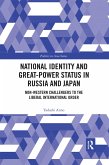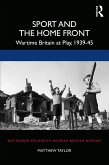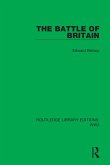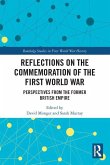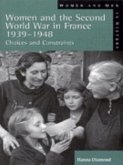Making Sense of Violence
Intellectuals, Writers, and Modern Warfare
Herausgeber: D'Auria, Matthew; Hewitson, Mark
Making Sense of Violence
Intellectuals, Writers, and Modern Warfare
Herausgeber: D'Auria, Matthew; Hewitson, Mark
- Broschiertes Buch
- Merkliste
- Auf die Merkliste
- Bewerten Bewerten
- Teilen
- Produkt teilen
- Produkterinnerung
- Produkterinnerung
This book looks at the representations of modern war by analysing texts and examining the ways in which authors related to the atrocious horrors of war.
Andere Kunden interessierten sich auch für
![National Identity and Great-Power Status in Russia and Japan National Identity and Great-Power Status in Russia and Japan]() Tadashi AnnoNational Identity and Great-Power Status in Russia and Japan58,99 €
Tadashi AnnoNational Identity and Great-Power Status in Russia and Japan58,99 €![The Maritime Archaeology of a Modern Conflict The Maritime Archaeology of a Modern Conflict]() Innes MccartneyThe Maritime Archaeology of a Modern Conflict59,99 €
Innes MccartneyThe Maritime Archaeology of a Modern Conflict59,99 €![Sport and the Home Front Sport and the Home Front]() Matthew TaylorSport and the Home Front56,99 €
Matthew TaylorSport and the Home Front56,99 €![The Battle of Britain The Battle of Britain]() Edward BishopThe Battle of Britain46,99 €
Edward BishopThe Battle of Britain46,99 €![Wilfred Owen (Routledge Revivals) Wilfred Owen (Routledge Revivals)]() Wilfred Owen (Routledge Revivals)31,99 €
Wilfred Owen (Routledge Revivals)31,99 €![Reflections on the Commemoration of the First World War Reflections on the Commemoration of the First World War]() Reflections on the Commemoration of the First World War59,99 €
Reflections on the Commemoration of the First World War59,99 €![Women and the Second World War in France, 1939-1948 Women and the Second World War in France, 1939-1948]() Hanna DiamondWomen and the Second World War in France, 1939-194867,99 €
Hanna DiamondWomen and the Second World War in France, 1939-194867,99 €-
-
-
This book looks at the representations of modern war by analysing texts and examining the ways in which authors related to the atrocious horrors of war.
Produktdetails
- Produktdetails
- Verlag: Routledge
- Seitenzahl: 210
- Erscheinungstermin: 20. Juli 2020
- Englisch
- Abmessung: 246mm x 174mm x 12mm
- Gewicht: 384g
- ISBN-13: 9780367534172
- ISBN-10: 0367534177
- Artikelnr.: 69936116
- Herstellerkennzeichnung
- Libri GmbH
- Europaallee 1
- 36244 Bad Hersfeld
- gpsr@libri.de
- Verlag: Routledge
- Seitenzahl: 210
- Erscheinungstermin: 20. Juli 2020
- Englisch
- Abmessung: 246mm x 174mm x 12mm
- Gewicht: 384g
- ISBN-13: 9780367534172
- ISBN-10: 0367534177
- Artikelnr.: 69936116
- Herstellerkennzeichnung
- Libri GmbH
- Europaallee 1
- 36244 Bad Hersfeld
- gpsr@libri.de
Matthew D'Auria is an intellectual historian working at the University of East Anglia, UK. His main research interest lies in the relationship between images of the nation and discourses about Europe in the modern age. Mark Hewitson is a Professor of German History and Politics at University College London, UK. His research interests lie principally in the intellectual, cultural, and political history of nineteenth- and twentieth-century Germany and Europe.
Introduction: Making sense of modern warfare Violence 1. Memory in warfare:
history as a destituent narrative 2. Progress, decline and redemption:
understanding war and imagining Europe, 1870s-1890s 3. Culture, resistance
and violence: guarding the Habsburg Ostgrenze with Montenegro in 1914 4.
Sender, those who have not returned: Carlo Salsa and his 'Trenches' 5. A
war of words: the cultural meanings of the First World War in Britain and
Germany 6. The Tannenberg myth in history and literature, 1914-1945 7.
Resistance politics of non-violence: Jean Paulhan's 'Fautrier the Enraged'
(1943) 8. The experience and the idea of war in the writings of Simone Weil
and Marguerite Duras 9. Violence and resistance: Joyce Lussu's minority
revolution in trans-lation
history as a destituent narrative 2. Progress, decline and redemption:
understanding war and imagining Europe, 1870s-1890s 3. Culture, resistance
and violence: guarding the Habsburg Ostgrenze with Montenegro in 1914 4.
Sender, those who have not returned: Carlo Salsa and his 'Trenches' 5. A
war of words: the cultural meanings of the First World War in Britain and
Germany 6. The Tannenberg myth in history and literature, 1914-1945 7.
Resistance politics of non-violence: Jean Paulhan's 'Fautrier the Enraged'
(1943) 8. The experience and the idea of war in the writings of Simone Weil
and Marguerite Duras 9. Violence and resistance: Joyce Lussu's minority
revolution in trans-lation
Introduction: Making sense of modern warfare Violence 1. Memory in warfare:
history as a destituent narrative 2. Progress, decline and redemption:
understanding war and imagining Europe, 1870s-1890s 3. Culture, resistance
and violence: guarding the Habsburg Ostgrenze with Montenegro in 1914 4.
Sender, those who have not returned: Carlo Salsa and his 'Trenches' 5. A
war of words: the cultural meanings of the First World War in Britain and
Germany 6. The Tannenberg myth in history and literature, 1914-1945 7.
Resistance politics of non-violence: Jean Paulhan's 'Fautrier the Enraged'
(1943) 8. The experience and the idea of war in the writings of Simone Weil
and Marguerite Duras 9. Violence and resistance: Joyce Lussu's minority
revolution in trans-lation
history as a destituent narrative 2. Progress, decline and redemption:
understanding war and imagining Europe, 1870s-1890s 3. Culture, resistance
and violence: guarding the Habsburg Ostgrenze with Montenegro in 1914 4.
Sender, those who have not returned: Carlo Salsa and his 'Trenches' 5. A
war of words: the cultural meanings of the First World War in Britain and
Germany 6. The Tannenberg myth in history and literature, 1914-1945 7.
Resistance politics of non-violence: Jean Paulhan's 'Fautrier the Enraged'
(1943) 8. The experience and the idea of war in the writings of Simone Weil
and Marguerite Duras 9. Violence and resistance: Joyce Lussu's minority
revolution in trans-lation



